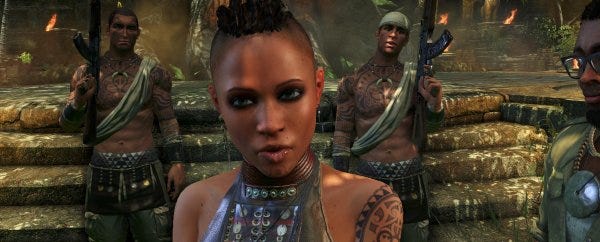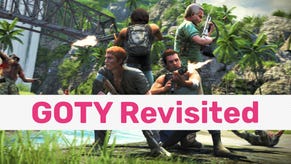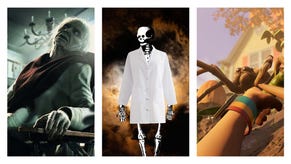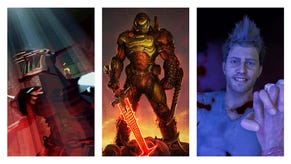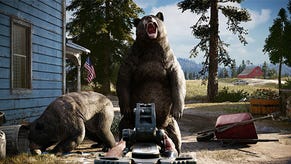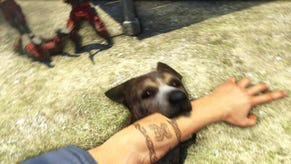Far Cry 3's Jeffrey Yohalem On Racism, Torture And Satire
Escape The Loop
Having completed Far Cry 3 a while back, I found that so much of the game's story just didn't sit right with me. Not simply in the sense that it appeared to contain colonialist nonsense and clumsily handled rape plots, but that I felt I was missing something. That the game was trying to say something to me, perhaps partly through that which I found problematic, and I hadn't been able to hear it. So I pursued the game's author, Jeffrey Yohalem, to talk it through.
Yohalem proves to be a very animated, very passionate writer, who sees Far Cry 3 as a complex exploration of many ideas, mostly questioning the role of the player in a game, and what they'll do in order to win. It was, he says, an attempt to break the loops of modern gaming, to ask the player to start to demand better. Fortunately, I'm animated and passionate too, so we get to discussing how successful this really was. What follows is a heated chat about what gaming could and should be. I return at the end with some thoughts on the conversation.
A frame of reference: Far Cry 3, an undoubtedly brilliant shooter, seemed to come with some odd baggage. Many who played it, including me, found its apparent use of "white messiah", "magical negro" and "noble savage" tropes to be somewhat disconcerting. While there was certainly no hatred or malice displayed to a particular race (unless that race is translucent white Hollywoodians), it seemed difficult to understand how the game wasn't employing stereotypes more familiar to 19th century literature. Along with that was a strangely vapid sequence in which you learn of the repeated rape of a friend, and some very peculiar sex scenes, all of which seemed like the worst of gaming in the midst of the best of gaming.
But at the same time, it didn't feel that simple. It felt like it was there for a reason - but a reason I couldn't grasp, and one I didn't think was explained by the time the game had ended. That's the position from which I began our spoiler-filled conversation.
RPS: My impression of Far Cry 3 was a game that wanted to say a lot more than most games do, but also a game that perhaps didn't quite manage to say some of those things. What was your overall goal when you started writing this game?
Jeffrey Yohalem: My goal was to say exactly what I think I say. I'm pretty happy with how it turned out. There's not really anything I would point to - I mean, there are a couple of things missing I guess, but those things supported points that are already made. The goal was to create a videogame that examined what shooting does to us in a videogame. When I play a videogame there are all kinds of systems that work on my brain, and most videogames try to hide those systems under a story. And that story is intended not to be about what's going on in the game. Almost every story in videogames is - I don't love this term but - ludo-narratively dissonant. It's purposeful, because stories usually pave over potholes in videogames. There are systems that don't quite work together, there are systems that create emotions in the animal parts of our brains that are uncomfortable, and so story is used not as something that conveys meaning, but as something that hides uncomfortable stuff, sublimates uncomfortable emotions.
RPS: Can you give an example of the kinds of things that are hidden by games like that?
Jeffrey Yohalem: You have a secret ops agent who's killed hundreds of people before as your protagonist, so it means that if you shoot hundreds of people over the course of the day in your videogame - which would never happen in reality unless you had a mass-murderer - that you, the player, are okay with that because the story has paved over the pothole. There's a lot of secret stuff going on behind the scenes in videogame companies and development houses. Players aren't seeing inside the box. I'm trying to expose the mechanisms inside the box.
RPS: I guess one of the key moments for what you're talking about in FC3 is when you return to the caves. Each time you return to the cave, and you see your girlfriend and friends, you have those moments of reconnecting to your humanity. But midway through the game those stop. So where do you see that continuing commentary on how Jason is being affected by shooting so many people? Or indeed how I'm being affected.
Jeffrey Yohalem: It's the player. The player is experiencing the loop. There's that moment where you're torturing your little brother to get information, which is taking something to the extreme. Other games have torture scenes and they try to pave over the pothole, by saying it's essential to saving humanity, you've got to find the terrorist and the bombs going to go off soon. They're trying to get the player to be okay with torturing somebody, because the gameplay mechanics of doing it are fun for them. So in this case it's torturing your little brother, and there's no real reason to be doing it. You're not saving the Earth, you're not doing anything that makes that act okay. That was meant to really shock people.
Also, the end! The end of this game is all about what you as a player are. It's your turn to be whoever you want to be. Who you want to be in the face of these gameplay loops. Throughout this whole game we took you through all of these loops, and at the end we point them out to you. Citra literally says it, that she's going to erase your save game, and she says if you want to win, you're going to complete the final tattoo. So the question is, do you want to win? Do you want to go through these gameplay loops.
So I think there's this misperception out there - and this is the most interesting misperception that I've found - people who thought the game was going to be an examination of shooting. Like, what it would be like to be a real person in this jungle, shooting people, and if you kill hundreds of people what happens to you. That's not what this game is about. It was never what this game was about. That may be what Spec Ops: The Line was about, it's not what this game is about. This game is about entertainment, and about how far will you go in these loops, and how much entertainment are you actually having from them. Are you willing to kill these characters in the game in order to finish your entertainment.
It's not a judgment about you, either. It's really something for the player to approach as smart, intelligent grown ups. It's a riddle for the player to solve. The player goes to the game and experiences this riddle - and if you go to this game without looking at it as a riddle, it's like looking at a building that has four supports and should have six. The game is not supposed to make sense if you're not looking for the riddle. It's supposed to destabilise your sense of what a traditional story is in a videogame. If you look at the story on the surface, then it doesn't hold up. There are all sorts of shocking exaggerations that are there to intentionally destabilise the player.
RPS: Would you suggest that one of those destabilisations is what has been perceived as racism?
Jeffrey Yohalem: Yes! It's NOT! It's the opposite! The game is the opposite. It's so funny to me. I've seen these arguments on forums, and I think these arguments are fantastic because people are engaging in a discussion about art, which is exactly what I was hoping would happen. But, the game's argument is that Jason is basically used by everyone on the island - Jason is basically a gun, that is upgraded by the natives on the island. It's the opposite of Avatar. And it's fantastic to me, because Citra is standing in front of the home tree when you first meet her, you're called Snow White, the people are called the Rakyat, which means "the people". It's the laziest name for a tribe ever, they're not real, they're a metaphor. People need to be looking at the names of these things. There are all kinds of secrets in this game for people to figure out, that tie into the main plot. It's all part of what the game is trying to say.
I wanted to create this gigantic riddle. I created the glyph puzzles in Assassin's Creed 2 and Assassin's Creed: Brotherhood, and this is a gigantic glyph puzzle.
RPS: Do you not think there's a danger of having your cake and eating it? You're deliberately being a hokum story, you're deliberately evoking lazy stereotypes, but at the same time, aren't you just evoking lazy stereotypes?
Jeffrey Yohalem: Yes! Do you know what the name of the island is?! It's Rook Island! Which means to fraud people! Look up the definition - the definition of "rook" is, someone that steals your money, or it's a piece in chess. So this is an island that is a fraud. The point is, look under the surface. Not because the game is a fraud, the game is not a fraud, but the island is. What is going on on this island, and the clues are right there in front of you. In my mind it's an interesting undertaking to take on some kind of examination of deeper issues like this, because like you said if people don't examine it that way, then maybe they don't see it? But like I told you, I was building a building that has four legs instead of six. If you don't see those issues, the thing doesn't make sense. I find it fascinating again, all the stuff that people are discussing on the internet, because you can see that the people who only looked at the surface are really uncomfortable. So much so that they keep discussing it. So to me that says that the story is not fitting. If the story functions correctly, like say Avatar - Avatar allows you to fit with the story. The story completes, then there's nothing to discuss any more. So your brain goes, "Yes, I like it." As humans we're always looking for meaning, and for things to make sense. So if you miss the deeper meaning it doesn't make sense any more.
The end of this story is very blatantly a subversion of any kinds of racist stereotypes. What I feel like what's happened is to explain this story you need more than a soundbite, and I feel like a lot of people just glancingly looked at the thing and then got upset. They didn't actually explore the whole game.
RPS: When I got to the end of the game what I saw was a depiction of a tribe, standing topless in simple clothes, dancing in a tribalistic way. It was very clearly an image of this archaic 19th century perspective of natives on an island. And I was given the choice to join them and as a white man become their leader, or walk away. I'm not quite sure how that squares up with a dramatic statement. How is it more than what I saw on the screen?
Jeffrey Yohalem: [Very animated] Because if you choose to become a part of that tribe and become their leader, it's completely manufactured in your head! It doesn't come from them at all! They never said "become our leader"! She says "become our king", she doesn't say "become our leader"! And then if you choose the tribe, she kills you! It turns out you were being used by them. The entire time you thought you were the leader of the whole tribe, you were nothing. You were just a gun that she upgraded with tattoos.
RPS: But is that any different from the tribe making you their leader, carrying you on their shoulders, and then boiling you in a pot?
Jeffrey Yohalem: [laughs] Yeah! It's exactly... I'm playing with all of that! The game is about playing. I was just reading an article this morning about the conceptual artist who did Lose/Lose, the space invaders game that deleted your files, created by Zach Gage. He did a piece where you'd come in a museum, and stand in front of the piece, and when you stand in front of it, it tallies that you stood in front of it. The point was to be a satire of popularity. Why would you judge something by the number of people who've seen it? Some people said, "This is great, that I stood in front of this piece and it's acknowledging my existence." So they were missing the satire. The artist is very clear in the article about what he wanted to say with that piece. So what I was hoping for with this game is that people would say, "Maybe there's something more interesting and different going on here that I can examine?" That videogames can be more than what they've been before. Which is covering up potholes in meaning instead of conveying it.
RPS: Do you not think that part of the problem of people's not interpreting it this way comes from the fact that the majority of games' stories are as bad as the thing you're parodying? They are atrocious. So people come into a game expecting these incredibly immature and incredibly simplistic, and often incredibly stereotyped storylines, so when they approach Far Cry 3, instead of saying "This is an arch commentary on that," they say, "Well this is another one of what most games are like."
Jeffrey Yohalem: That question is an interesting one, because I thought we went so extreme in such a huge number of ways, that we had been totally exaggerated. I've played all of these games, so the shocking thing for me is that people would think this is serious. At the same time, all of the articles coming out didn't come out for other games. So there must be some form of exaggeration, I must have succeeded at exaggerating. For example, the rape by Buck being glossed over, where he rapes Keith, or implied rape, that's so exaggerated because it's taking the exploitation of female characters in videogames and saying, well what if it's a man, how do you feel then?
In most games that exploitations is glossed over, so in this case it's glossed over. So by swapping out the Keith character for a female character, and then not having this deep emotional scene acknowledging the sadness from how these guy feels from that, it makes you really uncomfortable.
[Becoming agitated again] The sex scene [at the midpoint] - first Jason is shooting at that gigantic monster. He kills the monster, and it jump-cuts to him orgasming with Citra! He's firing sperm at this gigantic monster, and then suddenly he's on this alter with Citra, having sex with her, and then he thinks he's the leader of the tribe and makes the big speech, and it's his power fantasy! That's the other thing - it's all from first-person, so it's completely unreliable. There's a reason why Jason is a 25 year old white guy from Hollywood - these are all ideas that are in his head. You're seeing things through his eyes. That's why the Alice quotes are there, and why Willis's database entries are written from Willis's perspective, and not written from a universal perspective. So the game is all from a series of perspectives, and I think it's all there. And again, you could say to me, "Why isn't this even more exaggerated?", but why should it have to be? I don't understand why what I did isn't so insanely exaggerated already. What you're saying is that games are so bad with this stuff that it has to be so through the roof - I mean, male rape, having this transition, having the end of the game be that she kills you while having sex with you? And she says, "you win," as you're dying. The only thing more outrageous I could think of is if she castrated him.
RPS: You say the rape scene is critiquing how mawkishly rape scenes can be shown, but I'm not sure I understand your point when you say you changed it to a man to say something. When I played it, I saw that it was a situation where a man had been repeatedly raped. I didn't think, "Ah, but it's a man rather than a woman." I didn't find anything to make me compare it to rape scenes featuring women. What I fear with that scene is that it ends up becoming a sarcastic remark, at the expense of a really traumatising subject.
Jeffrey Yohalem: Well, I don't think it downplays a traumatising subject. Keith is not okay after that. He says very little for the rest of the game. You know, in Assassin's Creed II your mother is raped, and she doesn't talk for the rest of the game. So Keith is very similar. What he says after the rape is he tells you your brother is dead. Then he doesn't talk. I don't think that it downplays or is sarcastic. None of this is intended to be ironic - I don't like games, or jokes, that hold people at arm's length - that the only emotion that people can experience is the irony or the sarcasm of it, which is something I think was going on a lot in entertainment three or four years ago, maybe even two years ago, where it was all about, "Look how funny we are - we're making fun of this." That's not the point at all.
It's not intended to be glossed over in that sense. The intent was to not allow there to be some kind of cathartic sad scene where people get to deal with the fact that Keith's been through this. I don't give you the satisfaction, and it is a satisfaction, when you watch a character go through experiencing the torture of what they've just been through, it satisfies the player's expectations of that thing being addressed. So that scene is taken away from the player. So you have this disturbing exchange of power, something Jason and Buck experience, where Buck forces Jason to call him sir, demeans Jason and his manhood, this diminishing of who Jason is - of who the player is, because the player is in Jason's body.
And then the player experiences what Buck did to Keith. I really do think that it being a man matters. Throughout the game you have Daisy and Lisa, and Citra, and you expect certain things, the mistreatment of those characters, because of how past videogames have treated them. I don't think you're expected Keith to be treated as an object in that way. The fact that Buck did that is shocking, because it hasn't really happened in videogames before. And at the same time, videogames have a primarily male audience, so it's very easy to have this gratuitous portrayal of women in other games be glossed over and allowed by its audience, because it's not them. To really hit someone where they live, I think destabilises the trope. I'm hoping in the future when you encounter the objectification of women in games, you go, "Maybe this is uncomfortable, the way I felt uncomfortable in Far Cry 3."
To be fair, Far Cry does it twice. When Citra kills you at the end, it's like Mario thinking he's rescuing the princess for the whole game, and then the princess stabs Mario, and says "You win". The point is, she didn't need saving. She didn't need rescuing, she's not a princess in a castle, and she's not waiting for you to save her. In fact, it's all part of this elaborate ritual. It's not even clear that she needed your help to begin with. In fact Vaas was there to do it first, and Vaas left because he didn't want to be a part of her crazy ritual. It's not that she needed a white saviour at all. She didn't need a white guy at all. She was just looking for the ultimate warrior and someone to be her gun.
RPS: The problem for me is I didn't choose that ending. I chose not to slit the throat of my girlfriend! There's no way I was going to do that, so I walked away. While you get one less scene of her tits, you get a more elaborate ending for walking away, but you don't get this delivery of the punchline.
Jeffrey Yohalem: Correct. And with YouTube so big right now, I assumed everyone would go and look at the other ending, and I created it that way.
RPS: And I did - the first thing I did was look at the other ending on YouTube. But then I was vicariously seeing someone else's ending, I wasn't experiencing my ending, I wasn't getting my punchline to the game.
Jeffrey Yohalem: But if you don't choose to win, if you don't choose to get the final tattoo, to me you've chosen who you are - you're the guy who saves the girlfriend. The curation for you is different.
RPS: Do you think this understanding was carried by the rest of your team? I'm listening to your arguments, and I understand the points you're making, and I'm coming from the position of thinking this is one of the best games I've played in a long time. But stuff like the hunting for skins is so ridiculous in the game...
Jeffrey Yohalem: Right! Right, cos Jason asks why he's doing it. Isn't there a line where he says, "What am I supposed to do?", and an objective pops, an objective gives you what you're supposed to do.
RPS: Yeah, but the way it's delivered by the game, the mechanics of the game, don't seem to be carrying the same satire. To the point where, when you 'skin' an animal its skin is left on and you seem to take a lump of guts. Do you think the delivery of the game in some places fell short of the message you were trying to convey?
Jeffrey Yohalem: To me that helped the delivery. Games are built by gigantic production teams. So even if everybody on the team doesn't understand what the point of the game is, what I understood was: here's the direction that these people are going to go in. So to me all that continues to support the message of the game. Because the message of the game is, look at all these systems that we're creating, and if they're illogical, and if they're not challenging you as an individual but are just things for you to do that pass the time, then see how that makes you feel. The crazier the things that you're doing are, the more interesting it is that you're not going and helping the friends.
People who have looked at the surface of the game think that the story and the game are at war with each other as they are in most games, with the story just plugging potholes and the gameplay is going along its merry way. I think it's very exaggerated that, "Oh, go save the friends! Go save the friends!" but most people are out on the island doing all this other crazy stuff and experiencing the gameplay. And that's actually the point of the story.
It's not a game about go save your friends. It's a game about - doing a lot of picking skins from things, and wait, it's just a pile of meat - this doesn't even make sense, yet I'm still doing it instead of saving the friends.
RPS: How on board were the project leads with your ideas?
Jeffrey Yohalem: The director was a hundred percent. Pat Plourde is a genius. We worked together on Brotherhood and AC2, and something called The Lost Archive, which was a DLC for Assassin's Creed Revelations, where we started exploring some of these ideas. Of how gameplay and story could be one-to-one. That's about a guy named Clay, who's got all these support structures in his life, like his parents and assassins and his job. And gradually he loses all those support structures or they fail him. It's a game where you shoot blocks, and a block is a support structure that you're walking on, so the game gets increasingly harder to play, an ultimately he runs out of blocks and he has to kill himself by falling. It's a game about the loss of support, and that's conveyed literally through the gameplay. If you muted it, you'd still experience a game that's about the loss of support.
Far Cry 3 is a continuation of those ideas. He was entirely on board. And everyone else, in all of their different departments, understood what was going on, and what we were trying to say. But again it's such a labyrinthine production - as it is with every triple-A game - that on some levels it's like the Wild West. You have this freedom to express things in a way you wouldn't have in a blockbuster movie.
RPS: In Roland Barthes' essay The Death Of The Author, he argues that the author is meaningless once the piece is out there, that the understanding is in the interpretation of the viewer. If most people come away from this game saying either it's racist, or it's old-school colonialism, do you still think you've succeeded in what you've set out to do?
Jeffrey Yohalem: I think that's an interesting hypothetical question, because my feeling is most people aren't feeling that way. I get the impression that it's a small minority of people who feel that it's racist, or talking about that. So my hope is that a vast majority of people do not come away feeling that way, because then they'll have missed the point. But, the point is for them to examine who they are. I feel like we're living in this incredible time when you can actually experience someone else's curated mind. To me that's what games are. To me that's where the Death Of The Author argument doesn't necessarily hold up. This experience is curated. It's curated by us. So all the systems you're playing on that island, and all the things that happen in the story, and all the moments that you play, are chosen. If an artist curates his installation in an art gallery, and it's very important spacially how things are laid out, although you could just ignore that and go to the bathroom in the art gallery instead of looking at anything, I think that there's no argument that if someone goes into that installation they're going to have some kind of impact that the author intended.
My argument is that the player is an actor, and the game is the director. And it's the job of a great director, as opposed to a bad director... A bad director says, "Look at this thing! Look at this! Feel what this thing is! Feel the power of this - cry!" A bad director tells an actor, "Cry now." Which the actor in their head goes, "Fuck this guy. I'm not feeling that." In fact, I want to do the opposite of what the director just told me. Not explaining why - it's really offensive. It's distrusting the actor's intelligence. Or even the actor's essence. So a great director instead says, "Here are all the things that are going on in the world in which this play occurs, and the script. We take those and see what fits with you and give me that." The goal of Far Cry 3 is to allow players... I think the problem with narrative in the past has been that writers are trying to say something, and they're trying to get the players to sit down and listen to it. My feeling is that games are interactive, they're about what you're doing in the world, they're about gameplay, and they're not about sitting there and telling anyone anything.
So they player gets up, and explores the world, and explores the curated experience, and he can't find everything in the world in that experience, and that's very intentional. The director has chosen what this island is made up of - it's called Rook Island, it's not called some other island - and the Alice quotes have an effect on you, and there's a meaning behind all the Alice quotes. And there's meanings you may find then in those things that surprises me as the author. Which is wonderful, because it's then like you're expressing your self. You take the story, and the puzzle pieces in the story, and you put them together in a pattern that I didn't realise, I go, "Wow, that isn't what I thought of at all when I was writing it." And it works. The only thing I wanted to ensure was that the surface reading of this plot didn't work. Like I said, I was trying to remove support structures from the building so the building would fall down if it was analysed that way.
RPS: Right, but I'm coming at this with the perspective of a player. So take the boss fight - in that moment it doesn't matter whether this is metaphorical, or if it's an arch commentary on the nature of boss fights - the reality is I'm still having to play through a really crappy boss fight. In that moment it doesn't really matter what commentary it's making - as a player I'm still having to struggle through a crappy fight. Do you see how the intention can become mistranslated in the mechanics of what the player has to do?
Jeffrey Yohalem: This is the most collaborative art form we've ever done as a species. It's incredible. If what you're saying is that not every element in this game lived up to what you feel is good as the player, that's valid because there are so many different art forms here. At the same time, what we try to do with Far Cry 3 is - you're choosing to go on this vision quest mission. So you could be hunting animals, or you could be... And by the way, you're hunting endangered species on these island - that's also intentional - it's supposed to be an exaggeration of things you do in other games. It's supposed to make you uncomfortable. Everything that we curated in there is supposed to make you feel uncomfortable in some way. Some of it I think didn't quite succeed, because it wasn't exaggerated enough as you said, but a lot of it is.
RPS: But again, we've just been trained over decades to shoot endangered animals in Tomb Raider and Uncharted and so on - we're just used to shooting endangered animals. It's just another game having us shoot endangered animals at this point.
Jeffrey Yohalem: Yes, but if that were true then I wouldn't see articles on the internet about it.
RPS: But people have always mocked the Tomb Raider games for the fact you're shooting endangered species!
Jeffrey Yohalem: Yeah, but then there are all these articles online talking about how disgusting it is in Far Cry. Modern art felt like it couldn't shock anyone any more. Modern art's been in this strange period where it's trying very hard to be relevant, and to shock people, and this videogame seems to have shocked a lot of people.
RPS: But so do sick, stupid videogames. A game like Medal Of Honor I felt was deeply revolting, a really vile game. I find it problematic that the writer of that game could come back and say, "Ah, but it was satire." Do you see - it's maybe too easy a get-out?
Jeffrey Yohalem: Yes, of course it's too easy a get-out! That's why I put all the clues in there. There are dozens of clues! Of course it's lazy if it's not real satire. If it's not real satire I can't come after the fact and tell you - that's the point of the clues. Before the game is produced, all the clues are put in there, so when you say exactly what you just said to me, I go, but wait, look at this, this, this and this.
You may say that the things I'm saying to look at, like the name of the island - if you analyse each of the Alice quotes it's about the metaphor behind each of the characters you're experiencing - and the island is clearly Never Never Land, and there are all these references... You pointed out one of the clues - the Snow White clue. If this was about the white messiah motif, would I be so stupid as to have a main character's nickname be Snow White? I'm making fun of that!
RPS: But I think where you say, "Would I be so stupid?" you really get to the key issue here. Most games writers are being stupid! We don't have any background to assume you're being smart here. It's so much simpler for the player to assume you were being as stupid as most game stories are.
Jeffrey Yohalem: My experience of this has been that literally... that gameplay has a tutorial at the beginning of the game, where it's explained how to play. Or over the course of the game - in Assassin's Creed, over the course of the whole game you're explained how to play all the different systems. So I never thought that story should have a tutorial until experiencing this. Whether maybe there was a point where I should have literally had a tutorial in the game. For me it was the death of Grant, that Grant as the main videogame classic protagonist being shot in the head at the beginning of the game - this game is not that. And Alice quotes at the beginning. All of that was supposed to put you in this state of, "Okay, I'm going to examine this differently." Maybe I needed to be even clearer. What I've been doing now in interviews is trying to explain the story tutorial, which for me is not a negative because gameplay gets to do it. I don't feel like I'm cheating in some way to say that maybe you should examine this as a riddle or a puzzle. That's what I would have put at the beginning of the game if I were putting a tutorial in. What I was trying is create a game with the story, which means it's interactive. And it's something that players come to if they want, not something that they're forced to.
My biggest surprise has been that people didn't expect something like this, and I guess I should have anticipated that.
RPS: Do you think that because this is following on from Far Cry 2, for whatever it achieved it didn't have this sort of depth behind it. Do you think people's expectations are set because it's the third game in a series?
Jeffrey Yohalem: I don't think so. I think Far Cry 2 talked a lot about philosophical and artistic issues, and that was my opening. For me FC2, with the guns jamming and the malaria and all these systems that were considered not fun, it was about deconstructing the fun of a videogame. I thought Clint was very clear in a lot of interviews he did that that was what he was doing. He was trying to be philosophical about videogames, about their fundamental mechanics. If you have a gun that can jam at any point when you're shooting it disrupts the flow. So he's examining what makes a game fun, if I take away what's considered traditionally fun.
So Far Cry 3 is actually doing the same thing - and I'm surprised that no one's referenced that connection between the two of them - it's just that Far Cry 3 is saying, what if I give you so much quote-unquote fun that it becomes uncomfortable. It's a different approach to the same problem - they're both trying to approach building the same building, I think. Everyone keeps saying how they're so different, but in reality I think conceptually he approached it from the mechanical side by disrupting the mechanics, and I approached it from the story side by disrupting the story.
RPS: But at the same time you can argue, you know, I'm spending my £30 on this game - I don't want to have my fun interrupted, and that...
Jeffrey Yohalem: YES! That's my...
RPS: ...I don't want to be the victim of your experiment.
Jeffrey Yohalem: That's my argument! What I experienced in Far Cry 2 is that I didn't have fun playing it, although I found the ideas really, really interesting - let's say. I'm not saying that was my experience, but that's something that you see out there. If you approach Far Cry 3 you're not going to find any of those problems. This is where the level of exaggeration issue comes in - if you turn the volume to 11, it's like you're screaming at the player and it's very uncomfortable. It turns a lot of players off. I was trying to reach a volume of, err, six. Like Cronenberg's A History Of Violence, you can approach Far Cry 3 on the surface level and still have a lot of fun. Now you may say that compromises some kind of artistic ideal, that if I had cast it so it was so exaggerated that it was not entertaining at all, unless you read it as commentary, then I would agree with you that it is forcing my opinion down the player's throat and being a bad director. My goal was to bring joy to everyone. But at the same time I'm hoping players can look at the riddles in the story and see that there's a lot more going on there. And actually look into themselves and learn something through the journey. The goal was really not to waste players' time, because we're going to die soon, and there's so much to read and watch and do on this planet.
RPS: You talked about how in previous Assassin's Creed games you questioned themes and tropes, and have gone far farther with that Far Cry 3. Do you think it's a fair criticism to say, why not make a game that doesn't make all these mistakes? Why set out to highlight the mistakes or the laziness, or the issues, or the laziness in the players - why not set out to make a game that's really good?
Jeffrey Yohalem: First of all, I don't think there's any laziness in the players. I think our players are some of the most intelligent, grown up, free-thinking people that there are. I feel like a lot of games don't respect that. I feel like we're in this place in the videogame industry where we're in an abusive relationship. Players feel like game developers don't respect them, and don't create meaningful works for them, so they call a lot of games stupid. And a lot of developers get upset because things are being called stupid, and they say that players don't get it anyway, so they just handhold them all the through. I think that's an abusive relationship. You need to break that cycle. You need to cause both sides to step back and say, "Maybe there's something else that we can both have between each other." We can create situation where players go, "Huh, maybe games have something interesting to say after all, and I'm going to listen." And then that puts the pressure on game developers to not create lazy crap. Players will see it. As soon as players are listening, game developers have to deliver. In that context you can see that Far Cry 3 is trying to break that loop, rather than create the thing that's going to happen when people are definitively sitting there, listening.
I feel like we're in a place still where there's this dark anger between the two sides. Far Cry 3 was trying to break that loop and say, maybe what we've been doing before... Vaas's insanity speech is the lynchpin of the game, because he's talking about videogames. If you take what's been done before, and you see it for what it really is, then can we make something better? Which is what Jason's speech and the good ending is about. Where he says, "I've been a monster, maybe I can't come back from this." But he thinks he can. So it's a statement of hope about the industry.
RPS: So are you now going to go on to make something better?
Jeffrey Yohalem: Yes... I'm not allowed to say anything...
[At this point a PR on the line panics and jumps in, assuming I'm asking what his next game is. I explain that I'm not. That it's a philosophical question.]
Jeffrey Yohalem: I'm not going to give away anything, but there's a statement at the end of that game, and I will hold true to it.
RPS: That seems a great place to stop. Thank you for your time.
So then. I think what I feel most strongly at this point is a wish that I'd experienced the Far Cry 3 Yohalem believes it is. It's unquestionably one of my favourite games in a good long time, but not because of the story, and perhaps even despite it. I can only imagine how more brilliant it would have been to have been understanding the experience on that level, alongside adoring the simple mechanics of playing the thing. I'm also fascinated to realise that the game's biggest mistake might have been covering up your tattoo with a wing suit. If completing it was so important, concealing it for the second half of the game seems to be a surprisingly dumb decision.
It's tempting to believe that some of Yohalem's claims about the game's intentions are a little too convenient, but he's right - what about all the clues? He said there were dozens more, but he wants people to find them for themselves. While I doubt very much that things like the crappy skinning animations are really a deliberate conceit to this meta-analysis, I have come away far more convinced that much of what felt simply poor about the game was genuinely an attempt to make me feel uncomfortable, to "destabilise" me, as Yohalem would put it. I think the mistake, perhaps, was the belief that being destabilised would have any profound effect on a player.
There's one larger issue, however, when it comes to my feeling that this is a case of wanting to have their cake, and smear it all over their faces. You may well have noticed that at the start of the interview, Yohalem says,
"The goal was to create a videogame that examined what shooting does to us in a videogame."
Then surprisingly soon after he said,
"This is the most interesting misperception that I've found - people who thought the game was going to be an examination of shooting. Like, what it would be like to be a real person in this jungle, shooting people, and if you kill hundreds of people what happens to you. That's not what this game is about. It was never what this game was about."
Where might they be getting this misconception from?! And it's worth noting that in a previous interview Yohalem said,
"We want this game to be about shooting. Let's make a game about shooting, and what it does to humanity. This game is our statement, and it's a very clear statement, about what we feel shooting means."
There's definitely an impression that the answer changes to excuse the game. With such stark contradictions in intent, it doesn't seem too surprising that the game has failed (in my mind) to convey the meaning he wished.
And as I say a few times above, we're pretty well worn when it comes to dealing with exaggerated, unbelievable plots, and no more so than with shooters. We make excuses for nonsensical stories because we enjoy the mechanic of shooting at targets in well designed locations, so there was no jarring moment in Far Cry 3 to make us think this was being any different. In a year that's contained the jingoistic stupidity of Black Ops 2, and the outright racist stupidity of Medal Of Honor, if anything Far Cry 3 felt less exaggerated and offensive. Throwing in racial stereotypes and colonial backward thinking just feels disappointing, rather than shocking. When you make a game that's satirising shooter power fantasies, and questioning what the player will do in order to progress through a game, you have to be more effecting and more grotesque than the norm, and Far Cry 3 simply isn't.
Sure, you aren't trying to save the world when you're torturing your brother, but you are trying to get through this scene so the game you paid for keeps progressing. And that's the same reason you might simulate torture in a game where there's some loose plot about preventing a terrorist - it doesn't matter that Jason's intentions are personal, we're only ever doing it to turn the page, and the point gets lost. In neither is the real world in any peril - there's only the concern that we don't get to see what happens next. Sure, that's something that's open to satire, but the mistake here was believing that there was ever any player-perceived noble intent in any of the other games that asked you to do it.
That's the mistake Far Cry 3's plot keeps making. I love that it was trying to be about gaming itself, that it was a statement, and I applaud it wholeheartedly for attempting this. But again and again, what Far Cry 3's story really does is just put another selection of negative examples on the piles of negative examples in gaming. From my perspective as a player, it wasn't pointing at them and asking me to question them - it was joining in with them, and asking me to accept it yet again. Yohalem is completely correct that his missing support structures for his house made me feel unsure what it was really about - I ended up writing much about how that made me feel, as did many others. Like he says, if all these articles are appearing about his game, and not the others, he must have done something right. But unfortunately, I think, rather than making us aware of the horrors of the starving Irish when he says they should eat their babies, instead it too often felt like he was publishing baby recipe books to the very hungry. As a work of satire, Far Cry 3 fails, simply because it required this interview to be apparent. But as an attempt, I'm delighted it's there, and I am thrilled to see what comes next.
